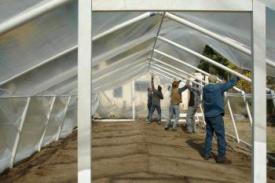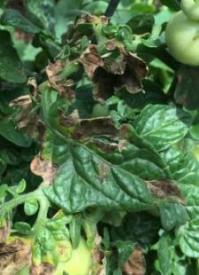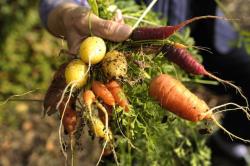Agriculture & Horticulture
Valencia County has 8,500 acres of irrigated land used for agricultural production and privately and publicly owned rangeland grazed by approximately 15,000 heads of beef annually.
Valencia County's Agriculture agent is available to assist farmers and ranchers in identifying and implementing practices that help them increase their economic viability. In addition, research-based education is provided through programs, workshops, and site visits.

Hoop House Production & Management
New Mexico's clear skies and intense sunshine allow local growers to utilize hoop houses to extend their growing season and increase production. Hoop houses allow growers to alter their garden's environment, protect their vegetables from wind and the intense sun, and create a microclimate with humidity, which can be helpful in our arid environment.
Creating such an excellent environment for growing doesn't come without its challenges. This same environment is also beneficial to some pests and diseases. Successful hoop house production requires managing both the benefits and the challenges.
- Circular 606: Hoop House Construction for New Mexico: 12-ft. x 40-ft. Hoop House
- Guide H-252: Hoop House Vegetable Production

Pests & Disease
Pest identification is the first step in any pest management situation. The practice of integrated pest management depends on "field scouting" or monitoring of pest populations and crop development. This step is critical since appropriate management methods may vary dramatically for each pest. Unfortunately, pest identification can be very difficult if you are unfamiliar with the weed, insect, or disease problems in your area. In addition, many pests share similar traits, which make identification extremely difficult.
- Guide A-231: Blossom-End Rot
- Circular 549: Chile Pepper Diseases
- Guide L-109: Controlling Pocket Gophers in New Mexico
- Guide H-106: Curly Top Virus
- Guide H-158: How to Collect and Send Plant Specimens for Disease Diagnosis
- Circular 600: Managing Aceria Malherbae Gall Mites for Control of Field Bindweed
- Circular 698: Noxious and Troublesome Weeds of New Mexico
Forage Production & Pasture Management
Forages contribute significantly to Valencia County's economy and all of New Mexico through job creation and food production, as well as providing environmental benefits such as soil protection and improvement of wildlife habitat.
Hay acreage remains relatively constant from one year to the next, and the value of New Mexico's hay per ton is usually higher than the national average. Forage crops are not only grown as stored feeds (hay and silage), but they are also used as pastures for livestock frequently visited by big game, migratory birds, and other wildlife.
For additional information regarding the economic impact of forage in New Mexico, visit NM Forage Facts.
- Circular 586: Grazing Systems and Management for Irrigated Pastures in New Mexico
- Guide A-325: Managing Weeds in Alfalfa
- Circular 654: Selecting Alfalfa Varieties for New Mexico

Vegetable & Fruit Production
Vegetable and fruit production is a long-standing tradition in Valencia County. Although the majority of farmland in Valencia County is used for forage production, an increasing number of acres are used for mixed vegetable and fruit production.
Information and training are available to increase the profitability and sustainability of vegetable and fruit production in Valencia County. Priority areas targeted include adopting best production practices, marketing, season extension, irrigation techniques, and encouraging sustainable agriculture practices for Valencia County's vegetable and fruit crops.
Viticulture
Almost four hundred years ago, the first wine grapes were planted in New Mexico soil at the San Antonio De Padua Mission just south of Socorro, New Mexico. Today there are approximately 1,200 acres of grapes planted in New Mexico and 38 wineries and tasting rooms located within the state. New Mexico-produced wines hold national and international awards.
In owning or starting a vineyard, staying abreast of the viticulture industry and local issues is essential. New Mexico State University can provide information and guidance on vineyard design and construction, tasting rooms, pest and disease management, soils, pruning, economics, and business planning.
- Circular 483: Growing Grapes in New Mexico
- Guide H-334: Managing Weeds in Grapes in New Mexico
- Circular 661: Soil Sampling With Respect to Salinity in New Mexico Vineyards

Marketing Strategies
The desire to eat local food, including locally grown fruits and vegetables, is a highly fast-growing market, not only here in New Mexico but nationally. This trend in consumer purchasing attitudes is a vast market opportunity for small-acreage farmers around the state.
As with every opportunity, there is a number of challenges, including land use, labor, water, and weather, as well as meeting the demands of larger markets such as volume, quality, and distribution. New Mexico State University is working with small-acreage farmers to help meet the demand and work through the challenges. Ongoing programs are hoop house construction to extend seasonal production, soil and cover crops, integrated pest management, growing fruits and vegetables, and value-added marketing.
Contact Information
Sierra Cain
Extension Agricultural Agent & County Program Director
Phone: 505-565-3002
Email: sierragh@nmsu.edu